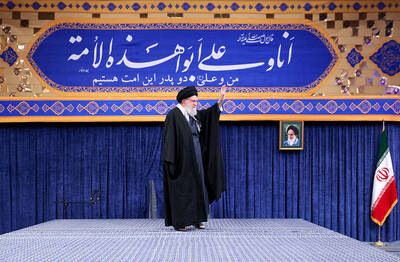Prime Minister Ariel Sharon's new government is set to take office next week, assuring a Cabinet majority in favor of his plan to pull out of Gaza and part of the West Bank, after a small ultra-Orthodox Jewish party agreed to join.
United Torah Judaism announced Wednesday that it will be part of the new government, replacing the hardline coalition that crumbled last summer over opposition to Sharon's plan to remove all 21 Gaza settlements and four from the West Bank.

PHOTO: AP
Sharon's Likud, with 40 seats in the 120-member parliament, will be joined by the moderate Labor Party with 21 seats and UTJ with five, providing a majority of 66.
"I believe that already next week I can present the parliament a new coalition that will lead the state of Israel," Sharon told a Likud meeting after the UTJ decision.
Avraham Ravitz, a UTJ representative in parliament, told Israel TV that the 95-year-old spiritual leader of the party, Rabbi Shalom Elyashiv, gave his approval for joining Sharon's team on Wednesday afternoon.
Ravitz said Elyashiv had to struggle with widespread opposition among Orthodox Jews to Sharon's pullout plan.
Israel TV said Sharon would present his new government to the parliament on Monday for a vote of confidence, after which it would take office. Labor Party leader Shimon Peres, 81, a Nobel Peace Prize laureate, is to be Sharon's second vice premier, and seven other Labor lawmakers will become Cabinet ministers.
In Palestinian politics, meanwhile, Mahmoud Abbas, the leading candidate for Palestinian president, received an enthusiastic welcome Wednesday from backers of his Fatah Party in the southern West Bank city of Hebron, ahead of the Jan. 9 election.
Hebron is a Hamas stronghold. Abbas has been making hard-line statements in recent days, hoping to attract the support of younger, more militant Palestinians.
Polls show he has a huge lead over his nearest rival, but analysts say he needs two-thirds of the vote to inherit some of Yasser Arafat's emotional support and clout.
Even with a new, centrist Israeli government in office, Sharon's pullout plan will still face parliamentary challenges. Thirteen Likud representatives who oppose the withdrawal are threatening to vote against the government and hold up legislation to allow its implementation.
Already a key law is stuck in a parliamentary committee because of Likud opposition, reflecting dissatisfaction among Sharon's traditional supporters with his new policy.
After decades of promoting settlement construction and expansion, Sharon switched gears a year ago with his pullout plan, infuriating his former friends. He explained that settlements with 8,200 Jews cannot continue to exist in the Gaza Strip among 1.3 million hostile Palestinians.
Settlers are opposed, some of them violently. After settlers clashed with soldiers on Monday over a relatively small matter -- demolishing two temporary structures at an unauthorized West Bank outpost -- Sharon warned he and his government will crack down on violent opponents.
"They shouldn't dare to even raise a hand against a policeman or a soldier," Sharon declared during a meeting with soldiers who weathered the clash with settlers on Monday. "We will act against (them) with all our might."
A soldier who called on his unit to defy orders to destroy the structures was sentenced Wednesday to 28 days in a military lockup, the military said.
Also, two settler leaders are being investigated on suspicion of inciting soldiers to disobey orders, the Justice Ministry said. One is Noam Livnat, brother of Education Minister Limor Livnat, from Sharon's Likud.
Though settlers make up about 3 percent of Israel's population, and religious and nationalist extremists are a small minority among the settlers, the possibility of violence is taken seriously.
The Haaretz daily printed an examination of the threat over the weekend, concluding that extremists might try to attack the Al Aqsa Mosque compound in Jerusalem, Islam's third most holy site, or assassinate Sharon in desperate attempts to stop the withdrawal.

Shamans in Peru on Monday gathered for an annual New Year’s ritual where they made predictions for the year to come, including illness for US President Donald Trump and the downfall of Venezuelan President Nicolas Maduro. “The United States should prepare itself because Donald Trump will fall seriously ill,” Juan de Dios Garcia proclaimed as he gathered with other shamans on a beach in southern Lima, dressed in traditional Andean ponchos and headdresses, and sprinkling flowers on the sand. The shamans carried large posters of world leaders, over which they crossed swords and burned incense, some of which they stomped on. In this

Indonesia yesterday began enforcing its newly ratified penal code, replacing a Dutch-era criminal law that had governed the country for more than 80 years and marking a major shift in its legal landscape. Since proclaiming independence in 1945, the Southeast Asian country had continued to operate under a colonial framework widely criticized as outdated and misaligned with Indonesia’s social values. Efforts to revise the code stalled for decades as lawmakers debated how to balance human rights, religious norms and local traditions in the world’s most populous Muslim-majority nation. The 345-page Indonesian Penal Code, known as the KUHP, was passed in 2022. It

‘TRUMP’S LONG GAME’: Minnesota Governor Tim Walz said that while fraud was a serious issue, the US president was politicizing it to defund programs for Minnesotans US President Donald Trump’s administration on Tuesday said it was auditing immigration cases involving US citizens of Somalian origin to detect fraud that could lead to denaturalization, or revocation of citizenship, while also announcing a freeze of childcare funds to Minnesota and demanding an audit of some daycare centers. “Under US law, if an individual procures citizenship on a fraudulent basis, that is grounds for denaturalization,” US Department of Homeland Security Assistant Secretary Tricia McLaughlin said in a statement. Denaturalization cases are rare and can take years. About 11 cases were pursued per year between 1990 and 2017, the Immigrant Legal Resource

ANGER: US-based activists reported protests at 174 locations across the country, with at least 582 arrested and 15 killed, while Khamenei said the protesters were ‘paid’ Iran’s supreme leader on Saturday said that “rioters must be put in their place” after a week of protests that have shaken the Islamic Republic, likely giving security forces a green light to aggressively put down the demonstrations. The first comments by 86-year-old Ayatollah Ali Khamenei come as violence surrounding the demonstrations sparked by Iran’s ailing economy has killed at least 15 people, according to human rights activists. The protests show no sign of stopping and follow US President Donald Trump warning Iran on Friday that if Tehran “violently kills peaceful protesters,” the US “will come to their rescue.” While it remains